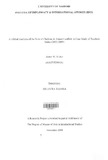| dc.contributor.author | Kioko, James M | |
| dc.date.accessioned | 2013-04-29T11:11:50Z | |
| dc.date.available | 2013-04-29T11:11:50Z | |
| dc.date.issued | 2008 | |
| dc.identifier.citation | Master Arts in International Studies | en |
| dc.identifier.uri | http://erepository.uonbi.ac.ke:8080/xmlui/handle/123456789/17654 | |
| dc.description.abstract | Participation of children in armed conflict in Kajo Keji County has been an issue
of major concern. Children as young as eight years were recruited in the army. The
recruitment was either voluntary or forced. This happened in disregard of international
legal instruments, national laws and customary laws that govern the treatment of children
under all circumstances.
This is a study to investigate the consequences of participation of children in
armed conflict. It raises pertinent issues on the state and conditions in which children
grew up in South Sudan and particularly Kajo Keji County. It highlights the social
development of children in Kajo Keji County. It examines in greater details what the
international law, the national law and customary say about children as far as protection
is concerned. The study has tried to compare the theoretical aspects of the law and the
actual practice on the ground.
The study found out that the use of child soldiers in the armed conflict in Southern
Sudan is widespread. Many children have either joined the fighting forces voluntarily or
they were forced to do so. All the international legal instruments regarding protection of
children in Southern Sudan have been flouted with impunity. There is no action that has
been taken against the OoS or SPLMJ A for violating laws which they are a party to. Most
of the structures necessary to facilitate effective CCPN were not there in Kajo Keji. This
became difficult for the community 10 - get much involved in issues pertaining to the
welfare of their children at a higher level. The administration of justice in South Sudan
was very weak. Courts did not exist and those that existed rarely functioned, sometimes
administering justice very unfairly. The people handling children cases had very little training or none at all on issues to do with administration of justice on children. Customary law continues to be in conflict with the intemationallaw. Girls are forcefully married off at a tender age against their will. Boys and girls below 18 years old are send to fight.
Social services in Kajo Keji County were very poor and limited. There was poor educational system in South Sudan. Schools were very few and those that existed were poorly equipped. They did not have good facilities. Classes were held under trees, there wasn't enough teaching and learning material, teachers did not have adequate training and others were not trained at all. They did not have skills of dealing with traumatized children who had been demobilized from the military. Health services were very few and had very limited supply of drugs. Many children died as a result of lack of adequate treatment. Hence there was very poor social development of children as a result of lack of services necessary to facilitate this. | en |
| dc.language.iso | en | en |
| dc.publisher | University of Nairobi | en |
| dc.title | A critical analysis of the role of children in armed conflict. A case study of Southern Sudan (2002-2005) | en |
| dc.type | Thesis | en |
| local.publisher | Institue of Diplomacy & International Studies (IDIS) | en |

